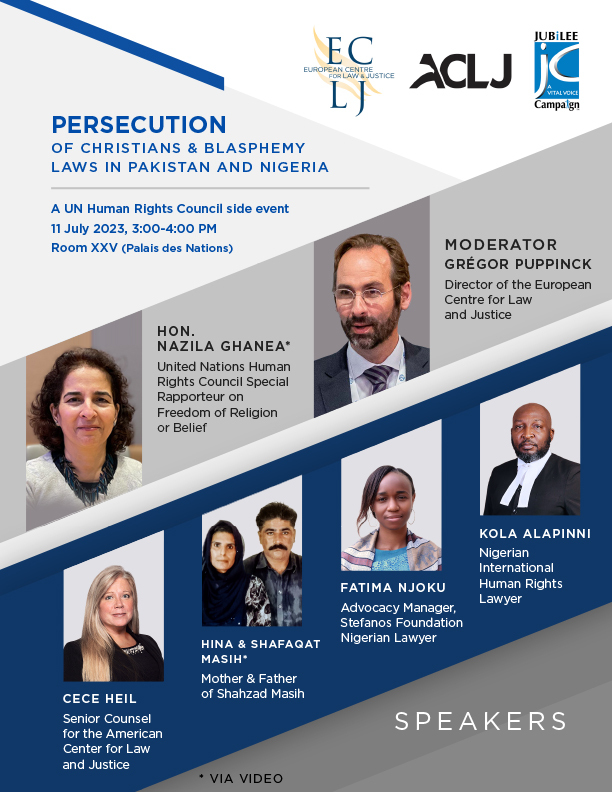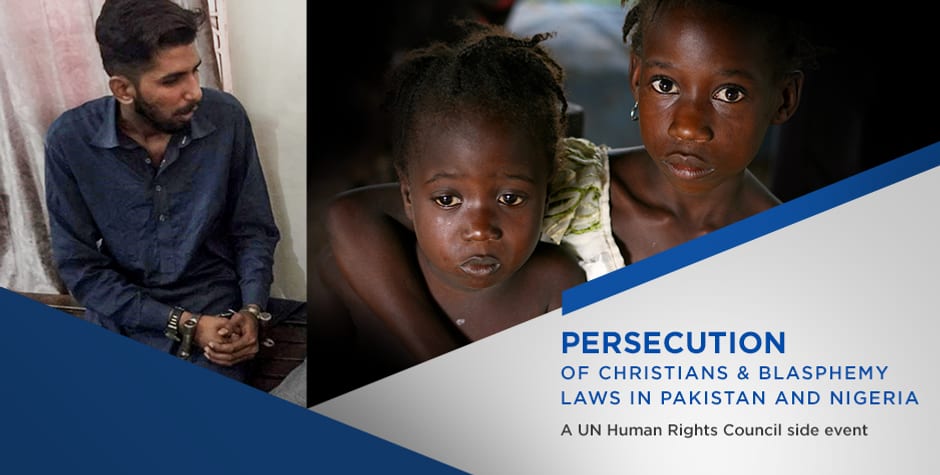ACLJ Hosts Event at the United Nations in Geneva To Raise the Plight of Persecuted Christians in Pakistan and Nigeria
While the United Nations Human Rights Council is meeting for its 53rd Session, Christian persecution continues in many parts of the world at an escalating pace. In addition to violations of their rights to freedom of speech and religion, Christians are being killed on a daily basis in many parts of the world.
As part of our advocacy at the U.N. for securing the rights of Christian minorities worldwide, the ACLJ, through its international affiliate the European Centre for Law and Justice (ECLJ), has partnered with our friends at Jubilee Campaign to host an event on the sidelines of the U.N. Human Rights Council session in Geneva, Switzerland. Joining us in this critical event is U.N. Special Rapporteur on Freedom of Religion or Belief Nazila Ghanea, who is a key official in combating persecution globally.
The event will cover two countries in particular: Pakistan and Nigeria. The focus will be on blasphemy laws in both countries, highlighting Shahzad Masih’s death penalty case in Pakistan and violence against Christians in Nigeria.

As our legal memorandum for the event explains, blasphemy laws in Pakistan are some of the harshest in the world, while remaining vague and often misapplied. These overly broad laws allow for minority religious groups to be easily targeted with false accusations of blasphemy to settle personal scores and vendettas.
Shahzad Masih’s is one such case. This Christian boy was just 16 years old when he was arrested in July 2017 after his Muslim co-worker accused him of committing blasphemy. Shahzad’s case is particularly outrageous, because even the accusations made by the prosecution’s version of the facts do not even constitute blasphemy. After facing trial for over five years, Shahzad was sentenced to death by hanging in November 2022.
Shahzad Masih’s case is just one in the long list of blasphemy cases in Pakistan. Since the 1980s, over 2,000 cases have been registered under these barbaric laws, over 70 people have been murdered, and hundreds have been imprisoned – many on death row or serving life sentences. Additionally, homes and even entire villages of Christians have been vandalized and burned down.
On a different continent, Nigeria also punishes defamation of Islam with the death penalty. In addition to persecution under the blasphemy laws, Nigerian Christians also face the wrath of jihadist militias, including Fulani militants and Boko Haram.
Since 2009, more than 52,250 Christians have been killed, more than 700 Christians have been abducted, and more than 18,000 churches and 2,200 Christian schools have been burned down in Nigeria by Islamic militants. This violence has forced 5 million Christians from their homes to refugee camps. Rather than violence subsiding, reports show that Nigeria accounted for an astounding 90% of all Christians who were killed worldwide for their faith in 2022.
Two teams of lawyers from the United States and Nigeria will be gathering at the U.N. on July 11, 2023, at Palais des Nations to discuss these issues with stakeholders, including U.N. officials, representatives of numerous governments’ permanent missions, and NGOs.
This event will place us directly in front of key stakeholders and world leaders to make the case for the protection of persecuted and dying Christians. It will be a powerful opportunity.
Shahzad Masih’s parents will make a video presentation to plead for their son’s freedom. The Honorable Nazila Ghanea, U.N. Special Rapporteur on Freedom of Religion or Belief, will also present her keynote statement via video at the event. In addition, panelists from the United States and Nigeria, including ACLJ Senior Counsel CeCe Heil and ECLJ Director General Grégor Puppinck, will discuss blasphemy laws and Christian persecution in Pakistan and Nigeria.
We hope that authorities in both countries will soon realize how blasphemy laws are being abused and minorities are being persecuted at the hands of violent mobs and take action to remedy the situation.
